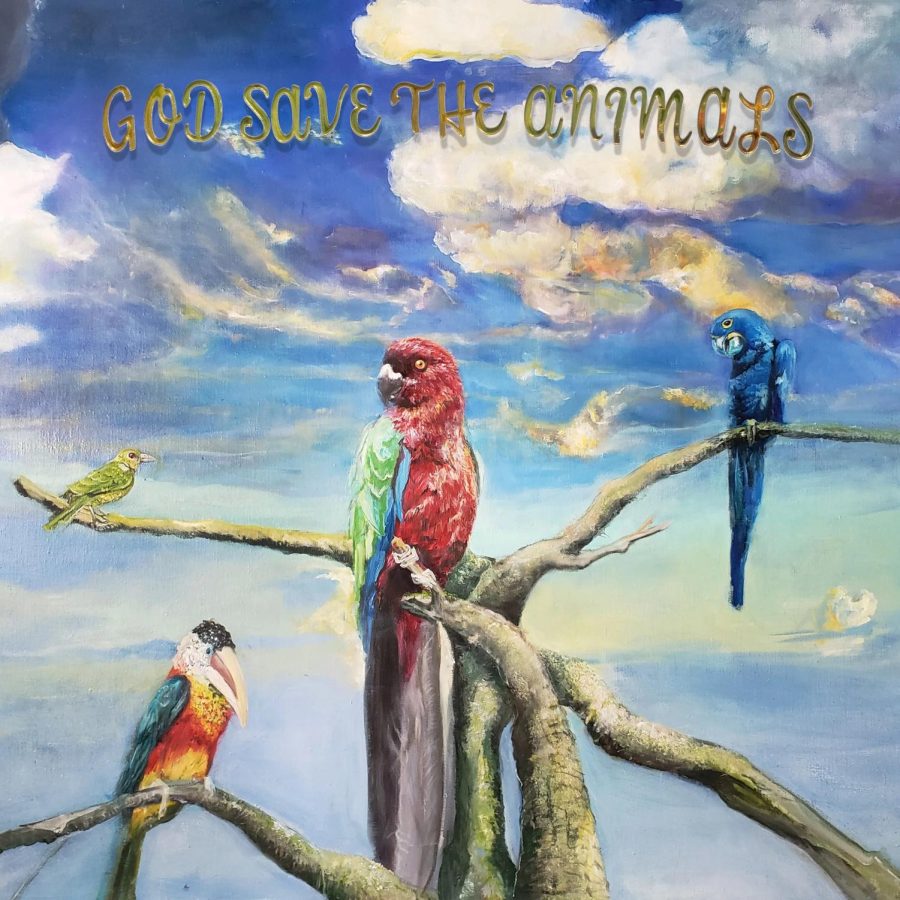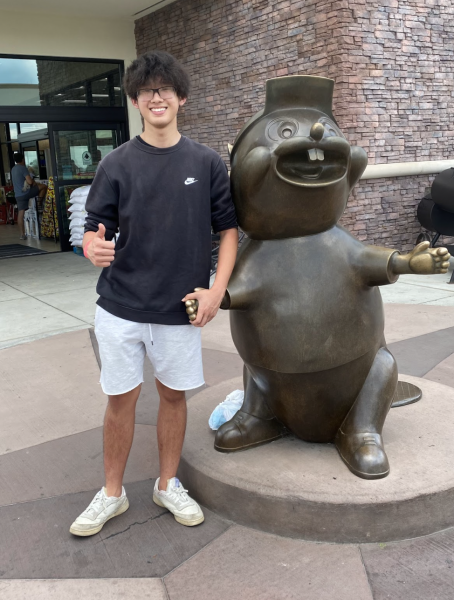Alex G shifts his focus with new album “God Save the Animals”
Photo courtesy of @sandyalexg Instagram
The cover of Alex G’s new album, “God Save The Animals,” includes a painting of four parrots perched on top of a barren tree.
October 4, 2022
Alex G’s music tends to linger in the dreamworld: psychedelic harmonies and swirling instrumentation in the forefront as he mutters sweet nothings about twee nightmares and fairytale endings. However, on his newest record, “God Save The Animals,” Alex Giannascoli decides to float down and ground himself in the earth, resulting in a genre-bending collection of songs that confront the harsh realities of suburban America, and by extension, his journey into adulthood. It’s a masterclass in extracting sadly warm stories from the quotidien.
Giannascoli is particularly focused on physicality which seems to permeate through both his lyricism and production. In “Blessing,” his voice is purposefully autotuned as he whispers a litany of gratitudes, like he’s a wayward preacher dripping with shameful desperation. Synths blare and dissonant guitar plucks cycle through the song, creating a heightened sense of panic, but Giannascoli never raises his voice. Instead, his head is hung low, faithfully devoted to a life of servitude with the knowledge that Christian catharsis will never come to fruition. “If I live like the fishes,” he accepts, “I will rise from the flood.”
Giannascoli’s second single “Runner” touches on themes that Giannascoli has explored in his discography – ranging from melancholic suffering to total absurdism – but undertones of heartland rock and summer lethargy elevates the track into an album standout. The chorus is strikingly similar to “Runaway Train” by Soul Asylum, a 1993 soft-rock hit focused on mental illness and missing children, which offers “Runner” a sense of nostalgia-washed euphoria with a sinister underbelly. As Giannascoli repeats that “he [has] done a couple bad things” after spending the majority of the song idolizing an unnamed “runner,” it suggests a relationship gone wrong: lover, friend, drug dealer? He keeps his subject vague, allowing listeners to revel in dopamine-filled guitar riffs and piano melodies.
Giannascoli’s longing for connection and companionship is exemplified in “Mission,” a patient lullaby reflecting on regret. His voice becomes crazed, almost animalistic, as he attempts to convince himself that he lived a rewarding life:
“I’ve lived my whole damn life, I’ve kept my mission tight—
Send my message to the chief, say ‘I did good, I stayed out
of the heat; I did good, I kept it on track.’”
Reminiscent of a dog pleading with his master, or a cow led to the slaughter, Giannascoli’s pathetic efforts to return to the past rings hollow. A woman’s voice in the chorus—a guardian angel, or maybe his inner monologue—gently reminds him that he “ain’t gonna right [his] wrongs with a stupid love song,” a painfully honest admission that for many, music serves as a medium for larger-than-life escapism. Bathed in the glow of wistful guitar and burbling violin, he ultimately offers a stark warning against small town contentment.
One of the defining features of humanity is our ability to hope. Unlike the other creatures that fill up our Earth, who succumb to impulses and instinct, we are able to recognize our mistakes and grow from them. Just a few years ago, Alex G was deeply individualistic: scarred by nihilism, dependent on drug-induced feelings, writing complex metaphors and twisted stories to communicate his views on life. On “Miracles,” however, he seems to have accepted the chaos of everyday living. Instead, he decides to focus on the small things: beautiful sunsets, infinite futures, miracles and crosses. In fact, the prayers that Giannascoli offers transcend organized religion. Gone are the cacophony and ambiguity of the front half of “God Save The Animals”; all that remains is his voice, backed by sweet fiddle and fingerpicked guitar. “How many more songs am I supposed to write,” he asks, “before I should turn it off and say goodnight?” For Giannascoli, this welcoming of the uncertain is a revelation.



